Benefits of Strategic and Collaborative Planning in Tourism for Deal
VerifiedAdded on 2023/06/18
|14
|5223
|297
AI Summary
This article discusses the benefits of strategic planning for tourism in a coastal area, using Deal as an example. It also explores the significance of collaborative planning in tourism and its usefulness for Deal, particularly in the context of tourism recovery during COVID-19. Additionally, the article outlines the vision and objectives for addressing Deal's issues and challenges.
Contribute Materials
Your contribution can guide someone’s learning journey. Share your
documents today.
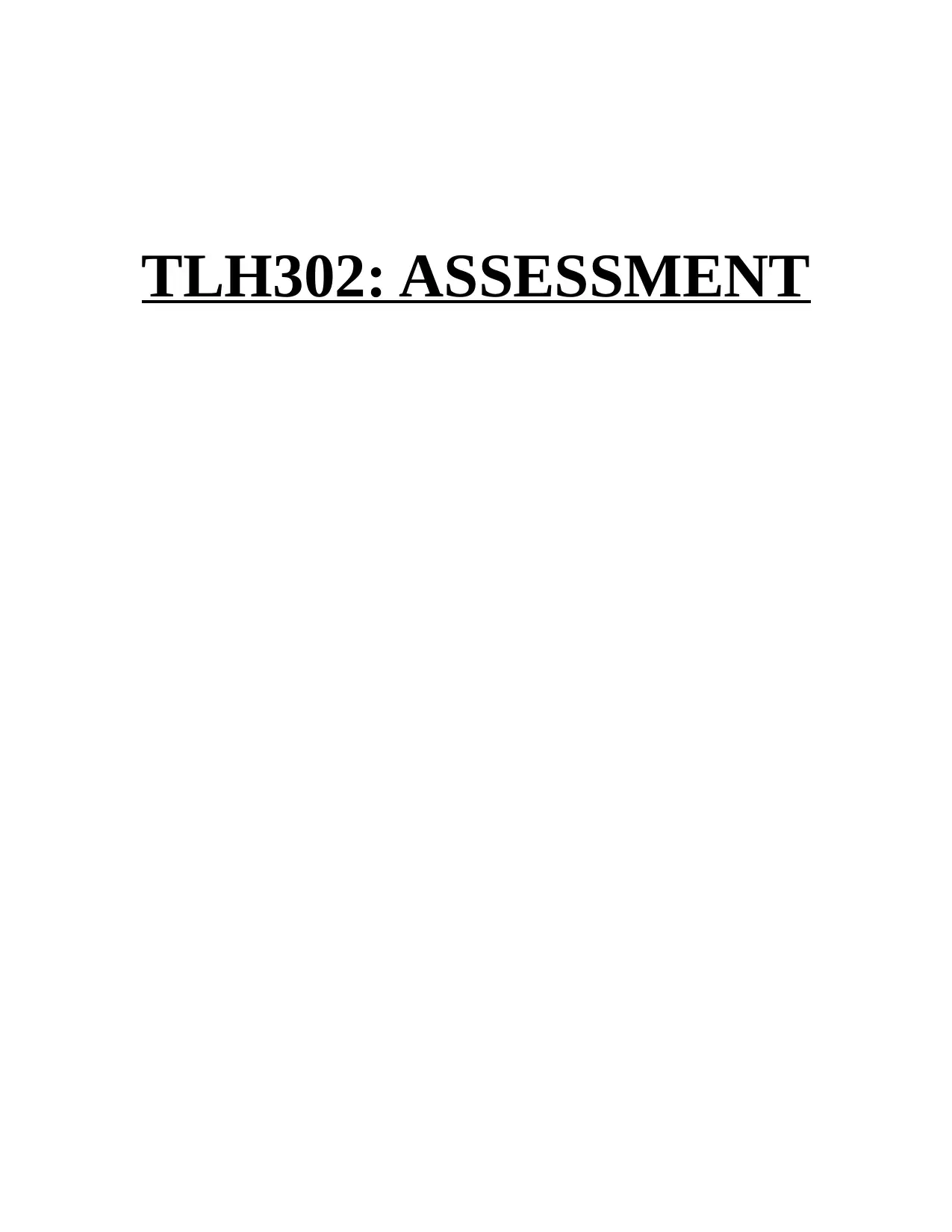
TLH302: ASSESSMENT
Secure Best Marks with AI Grader
Need help grading? Try our AI Grader for instant feedback on your assignments.
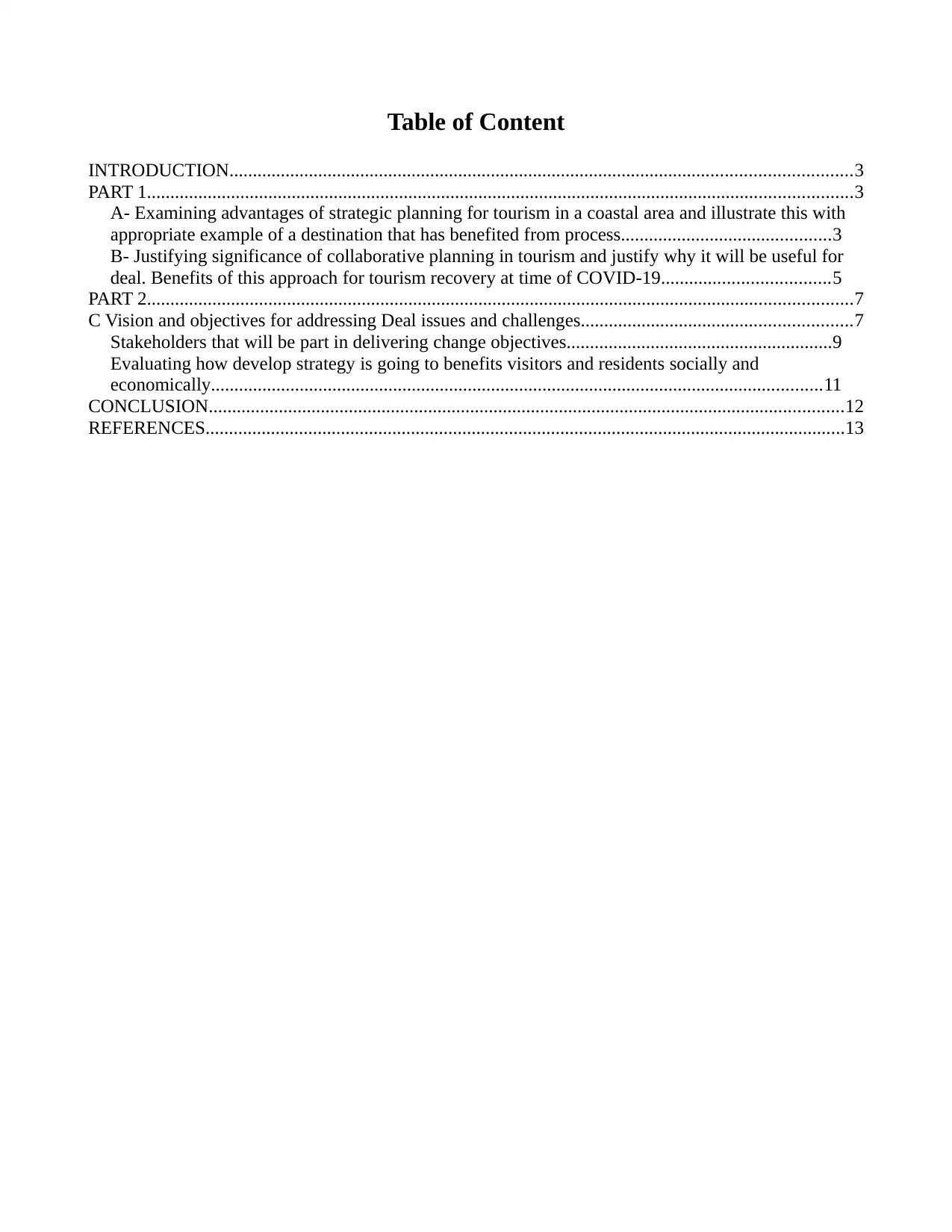
Table of Content
INTRODUCTION.....................................................................................................................................3
PART 1.......................................................................................................................................................3
A- Examining advantages of strategic planning for tourism in a coastal area and illustrate this with
appropriate example of a destination that has benefited from process.............................................3
B- Justifying significance of collaborative planning in tourism and justify why it will be useful for
deal. Benefits of this approach for tourism recovery at time of COVID-19....................................5
PART 2.......................................................................................................................................................7
C Vision and objectives for addressing Deal issues and challenges..........................................................7
Stakeholders that will be part in delivering change objectives.........................................................9
Evaluating how develop strategy is going to benefits visitors and residents socially and
economically...................................................................................................................................11
CONCLUSION........................................................................................................................................12
REFERENCES.........................................................................................................................................13
INTRODUCTION.....................................................................................................................................3
PART 1.......................................................................................................................................................3
A- Examining advantages of strategic planning for tourism in a coastal area and illustrate this with
appropriate example of a destination that has benefited from process.............................................3
B- Justifying significance of collaborative planning in tourism and justify why it will be useful for
deal. Benefits of this approach for tourism recovery at time of COVID-19....................................5
PART 2.......................................................................................................................................................7
C Vision and objectives for addressing Deal issues and challenges..........................................................7
Stakeholders that will be part in delivering change objectives.........................................................9
Evaluating how develop strategy is going to benefits visitors and residents socially and
economically...................................................................................................................................11
CONCLUSION........................................................................................................................................12
REFERENCES.........................................................................................................................................13
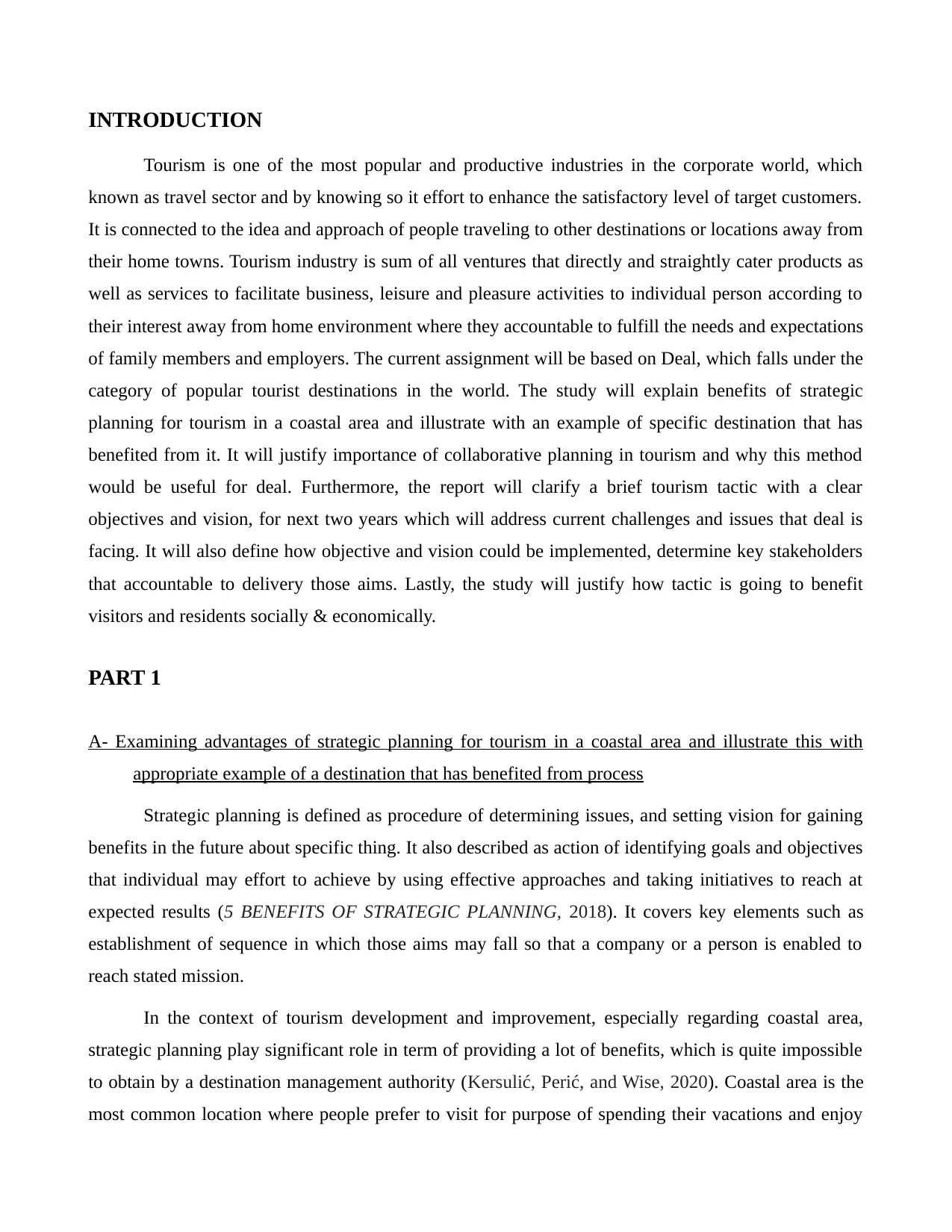
INTRODUCTION
Tourism is one of the most popular and productive industries in the corporate world, which
known as travel sector and by knowing so it effort to enhance the satisfactory level of target customers.
It is connected to the idea and approach of people traveling to other destinations or locations away from
their home towns. Tourism industry is sum of all ventures that directly and straightly cater products as
well as services to facilitate business, leisure and pleasure activities to individual person according to
their interest away from home environment where they accountable to fulfill the needs and expectations
of family members and employers. The current assignment will be based on Deal, which falls under the
category of popular tourist destinations in the world. The study will explain benefits of strategic
planning for tourism in a coastal area and illustrate with an example of specific destination that has
benefited from it. It will justify importance of collaborative planning in tourism and why this method
would be useful for deal. Furthermore, the report will clarify a brief tourism tactic with a clear
objectives and vision, for next two years which will address current challenges and issues that deal is
facing. It will also define how objective and vision could be implemented, determine key stakeholders
that accountable to delivery those aims. Lastly, the study will justify how tactic is going to benefit
visitors and residents socially & economically.
PART 1
A- Examining advantages of strategic planning for tourism in a coastal area and illustrate this with
appropriate example of a destination that has benefited from process
Strategic planning is defined as procedure of determining issues, and setting vision for gaining
benefits in the future about specific thing. It also described as action of identifying goals and objectives
that individual may effort to achieve by using effective approaches and taking initiatives to reach at
expected results (5 BENEFITS OF STRATEGIC PLANNING, 2018). It covers key elements such as
establishment of sequence in which those aims may fall so that a company or a person is enabled to
reach stated mission.
In the context of tourism development and improvement, especially regarding coastal area,
strategic planning play significant role in term of providing a lot of benefits, which is quite impossible
to obtain by a destination management authority (Kersulić, Perić, and Wise, 2020). Coastal area is the
most common location where people prefer to visit for purpose of spending their vacations and enjoy
Tourism is one of the most popular and productive industries in the corporate world, which
known as travel sector and by knowing so it effort to enhance the satisfactory level of target customers.
It is connected to the idea and approach of people traveling to other destinations or locations away from
their home towns. Tourism industry is sum of all ventures that directly and straightly cater products as
well as services to facilitate business, leisure and pleasure activities to individual person according to
their interest away from home environment where they accountable to fulfill the needs and expectations
of family members and employers. The current assignment will be based on Deal, which falls under the
category of popular tourist destinations in the world. The study will explain benefits of strategic
planning for tourism in a coastal area and illustrate with an example of specific destination that has
benefited from it. It will justify importance of collaborative planning in tourism and why this method
would be useful for deal. Furthermore, the report will clarify a brief tourism tactic with a clear
objectives and vision, for next two years which will address current challenges and issues that deal is
facing. It will also define how objective and vision could be implemented, determine key stakeholders
that accountable to delivery those aims. Lastly, the study will justify how tactic is going to benefit
visitors and residents socially & economically.
PART 1
A- Examining advantages of strategic planning for tourism in a coastal area and illustrate this with
appropriate example of a destination that has benefited from process
Strategic planning is defined as procedure of determining issues, and setting vision for gaining
benefits in the future about specific thing. It also described as action of identifying goals and objectives
that individual may effort to achieve by using effective approaches and taking initiatives to reach at
expected results (5 BENEFITS OF STRATEGIC PLANNING, 2018). It covers key elements such as
establishment of sequence in which those aims may fall so that a company or a person is enabled to
reach stated mission.
In the context of tourism development and improvement, especially regarding coastal area,
strategic planning play significant role in term of providing a lot of benefits, which is quite impossible
to obtain by a destination management authority (Kersulić, Perić, and Wise, 2020). Coastal area is the
most common location where people prefer to visit for purpose of spending their vacations and enjoy
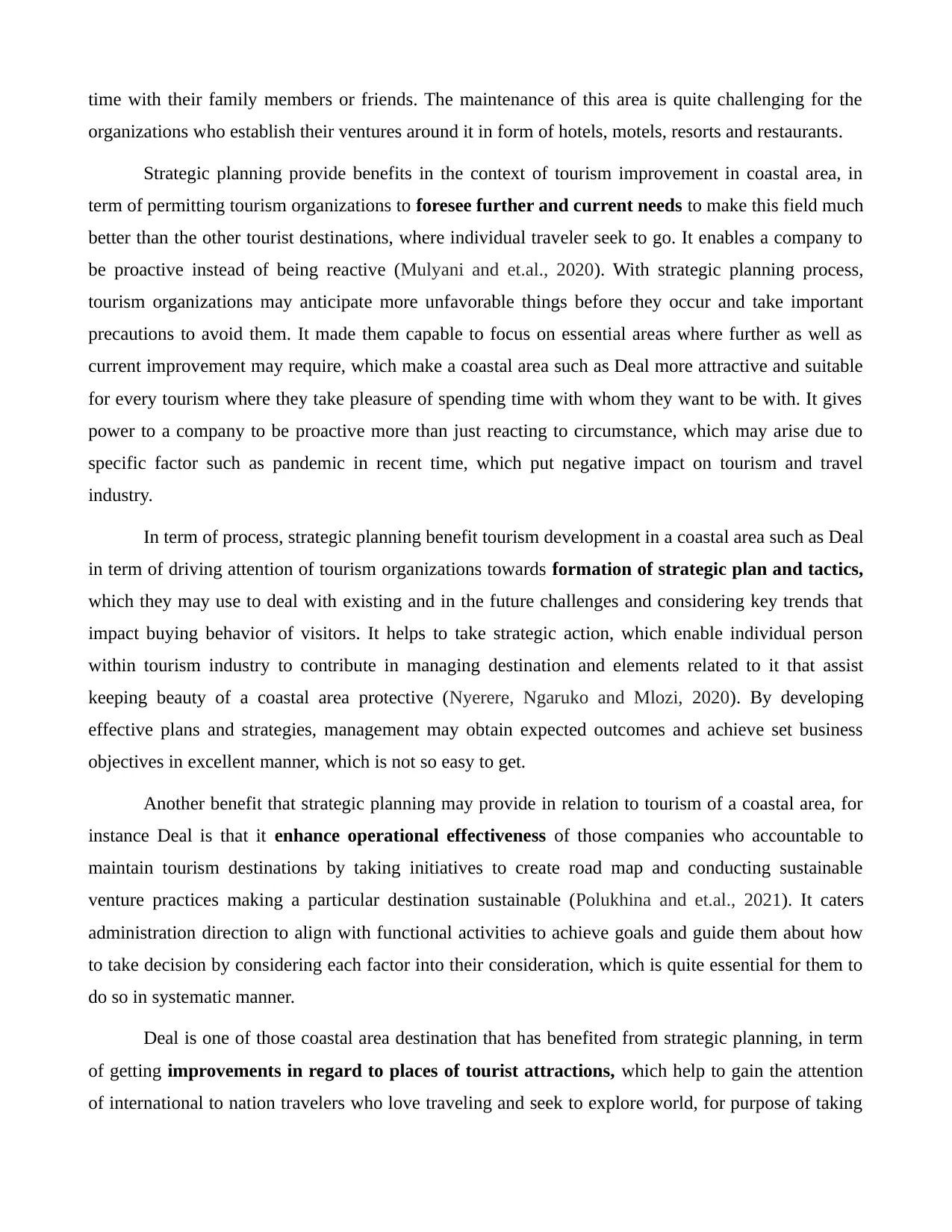
time with their family members or friends. The maintenance of this area is quite challenging for the
organizations who establish their ventures around it in form of hotels, motels, resorts and restaurants.
Strategic planning provide benefits in the context of tourism improvement in coastal area, in
term of permitting tourism organizations to foresee further and current needs to make this field much
better than the other tourist destinations, where individual traveler seek to go. It enables a company to
be proactive instead of being reactive (Mulyani and et.al., 2020). With strategic planning process,
tourism organizations may anticipate more unfavorable things before they occur and take important
precautions to avoid them. It made them capable to focus on essential areas where further as well as
current improvement may require, which make a coastal area such as Deal more attractive and suitable
for every tourism where they take pleasure of spending time with whom they want to be with. It gives
power to a company to be proactive more than just reacting to circumstance, which may arise due to
specific factor such as pandemic in recent time, which put negative impact on tourism and travel
industry.
In term of process, strategic planning benefit tourism development in a coastal area such as Deal
in term of driving attention of tourism organizations towards formation of strategic plan and tactics,
which they may use to deal with existing and in the future challenges and considering key trends that
impact buying behavior of visitors. It helps to take strategic action, which enable individual person
within tourism industry to contribute in managing destination and elements related to it that assist
keeping beauty of a coastal area protective (Nyerere, Ngaruko and Mlozi, 2020). By developing
effective plans and strategies, management may obtain expected outcomes and achieve set business
objectives in excellent manner, which is not so easy to get.
Another benefit that strategic planning may provide in relation to tourism of a coastal area, for
instance Deal is that it enhance operational effectiveness of those companies who accountable to
maintain tourism destinations by taking initiatives to create road map and conducting sustainable
venture practices making a particular destination sustainable (Polukhina and et.al., 2021). It caters
administration direction to align with functional activities to achieve goals and guide them about how
to take decision by considering each factor into their consideration, which is quite essential for them to
do so in systematic manner.
Deal is one of those coastal area destination that has benefited from strategic planning, in term
of getting improvements in regard to places of tourist attractions, which help to gain the attention
of international to nation travelers who love traveling and seek to explore world, for purpose of taking
organizations who establish their ventures around it in form of hotels, motels, resorts and restaurants.
Strategic planning provide benefits in the context of tourism improvement in coastal area, in
term of permitting tourism organizations to foresee further and current needs to make this field much
better than the other tourist destinations, where individual traveler seek to go. It enables a company to
be proactive instead of being reactive (Mulyani and et.al., 2020). With strategic planning process,
tourism organizations may anticipate more unfavorable things before they occur and take important
precautions to avoid them. It made them capable to focus on essential areas where further as well as
current improvement may require, which make a coastal area such as Deal more attractive and suitable
for every tourism where they take pleasure of spending time with whom they want to be with. It gives
power to a company to be proactive more than just reacting to circumstance, which may arise due to
specific factor such as pandemic in recent time, which put negative impact on tourism and travel
industry.
In term of process, strategic planning benefit tourism development in a coastal area such as Deal
in term of driving attention of tourism organizations towards formation of strategic plan and tactics,
which they may use to deal with existing and in the future challenges and considering key trends that
impact buying behavior of visitors. It helps to take strategic action, which enable individual person
within tourism industry to contribute in managing destination and elements related to it that assist
keeping beauty of a coastal area protective (Nyerere, Ngaruko and Mlozi, 2020). By developing
effective plans and strategies, management may obtain expected outcomes and achieve set business
objectives in excellent manner, which is not so easy to get.
Another benefit that strategic planning may provide in relation to tourism of a coastal area, for
instance Deal is that it enhance operational effectiveness of those companies who accountable to
maintain tourism destinations by taking initiatives to create road map and conducting sustainable
venture practices making a particular destination sustainable (Polukhina and et.al., 2021). It caters
administration direction to align with functional activities to achieve goals and guide them about how
to take decision by considering each factor into their consideration, which is quite essential for them to
do so in systematic manner.
Deal is one of those coastal area destination that has benefited from strategic planning, in term
of getting improvements in regard to places of tourist attractions, which help to gain the attention
of international to nation travelers who love traveling and seek to explore world, for purpose of taking
Secure Best Marks with AI Grader
Need help grading? Try our AI Grader for instant feedback on your assignments.
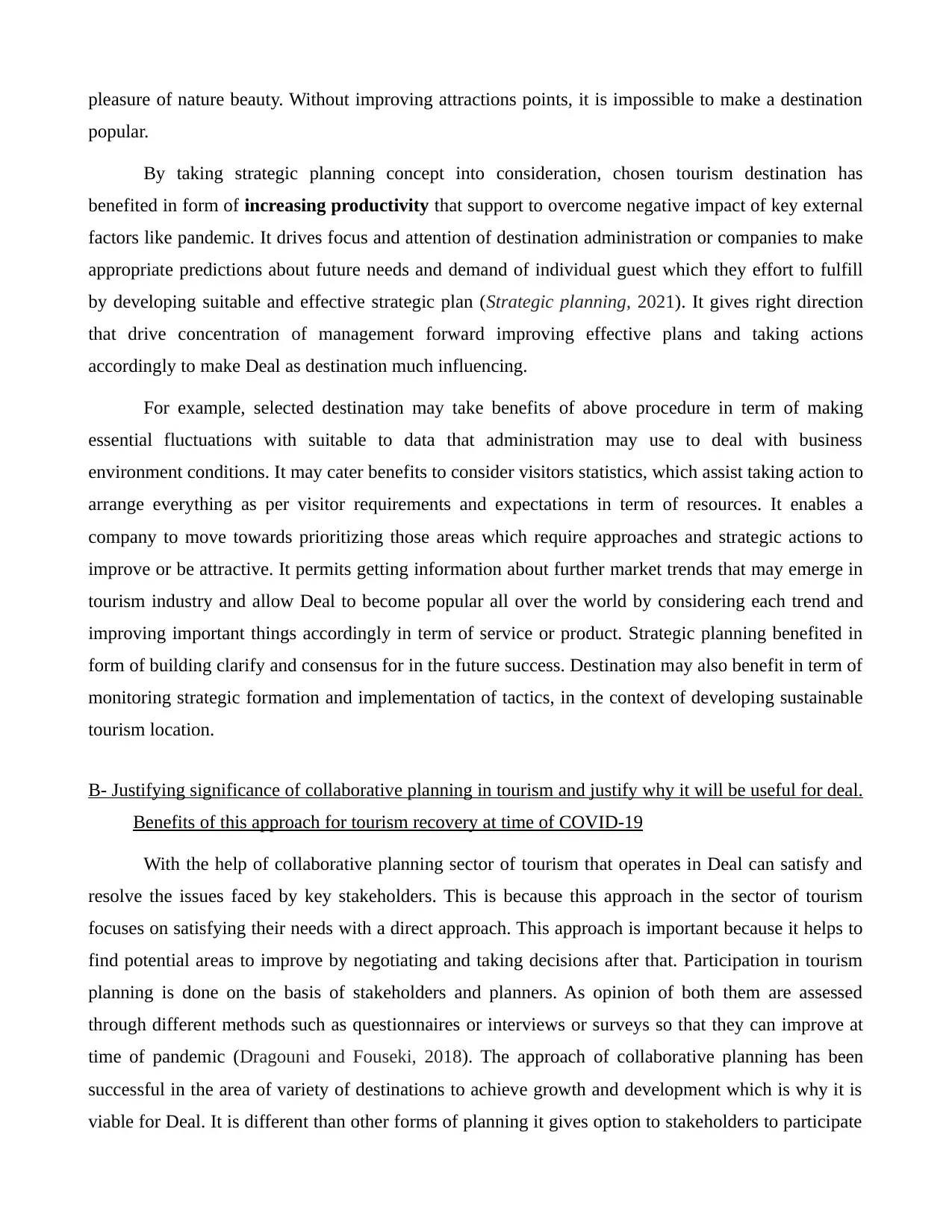
pleasure of nature beauty. Without improving attractions points, it is impossible to make a destination
popular.
By taking strategic planning concept into consideration, chosen tourism destination has
benefited in form of increasing productivity that support to overcome negative impact of key external
factors like pandemic. It drives focus and attention of destination administration or companies to make
appropriate predictions about future needs and demand of individual guest which they effort to fulfill
by developing suitable and effective strategic plan (Strategic planning, 2021). It gives right direction
that drive concentration of management forward improving effective plans and taking actions
accordingly to make Deal as destination much influencing.
For example, selected destination may take benefits of above procedure in term of making
essential fluctuations with suitable to data that administration may use to deal with business
environment conditions. It may cater benefits to consider visitors statistics, which assist taking action to
arrange everything as per visitor requirements and expectations in term of resources. It enables a
company to move towards prioritizing those areas which require approaches and strategic actions to
improve or be attractive. It permits getting information about further market trends that may emerge in
tourism industry and allow Deal to become popular all over the world by considering each trend and
improving important things accordingly in term of service or product. Strategic planning benefited in
form of building clarify and consensus for in the future success. Destination may also benefit in term of
monitoring strategic formation and implementation of tactics, in the context of developing sustainable
tourism location.
B- Justifying significance of collaborative planning in tourism and justify why it will be useful for deal.
Benefits of this approach for tourism recovery at time of COVID-19
With the help of collaborative planning sector of tourism that operates in Deal can satisfy and
resolve the issues faced by key stakeholders. This is because this approach in the sector of tourism
focuses on satisfying their needs with a direct approach. This approach is important because it helps to
find potential areas to improve by negotiating and taking decisions after that. Participation in tourism
planning is done on the basis of stakeholders and planners. As opinion of both them are assessed
through different methods such as questionnaires or interviews or surveys so that they can improve at
time of pandemic (Dragouni and Fouseki, 2018). The approach of collaborative planning has been
successful in the area of variety of destinations to achieve growth and development which is why it is
viable for Deal. It is different than other forms of planning it gives option to stakeholders to participate
popular.
By taking strategic planning concept into consideration, chosen tourism destination has
benefited in form of increasing productivity that support to overcome negative impact of key external
factors like pandemic. It drives focus and attention of destination administration or companies to make
appropriate predictions about future needs and demand of individual guest which they effort to fulfill
by developing suitable and effective strategic plan (Strategic planning, 2021). It gives right direction
that drive concentration of management forward improving effective plans and taking actions
accordingly to make Deal as destination much influencing.
For example, selected destination may take benefits of above procedure in term of making
essential fluctuations with suitable to data that administration may use to deal with business
environment conditions. It may cater benefits to consider visitors statistics, which assist taking action to
arrange everything as per visitor requirements and expectations in term of resources. It enables a
company to move towards prioritizing those areas which require approaches and strategic actions to
improve or be attractive. It permits getting information about further market trends that may emerge in
tourism industry and allow Deal to become popular all over the world by considering each trend and
improving important things accordingly in term of service or product. Strategic planning benefited in
form of building clarify and consensus for in the future success. Destination may also benefit in term of
monitoring strategic formation and implementation of tactics, in the context of developing sustainable
tourism location.
B- Justifying significance of collaborative planning in tourism and justify why it will be useful for deal.
Benefits of this approach for tourism recovery at time of COVID-19
With the help of collaborative planning sector of tourism that operates in Deal can satisfy and
resolve the issues faced by key stakeholders. This is because this approach in the sector of tourism
focuses on satisfying their needs with a direct approach. This approach is important because it helps to
find potential areas to improve by negotiating and taking decisions after that. Participation in tourism
planning is done on the basis of stakeholders and planners. As opinion of both them are assessed
through different methods such as questionnaires or interviews or surveys so that they can improve at
time of pandemic (Dragouni and Fouseki, 2018). The approach of collaborative planning has been
successful in the area of variety of destinations to achieve growth and development which is why it is
viable for Deal. It is different than other forms of planning it gives option to stakeholders to participate
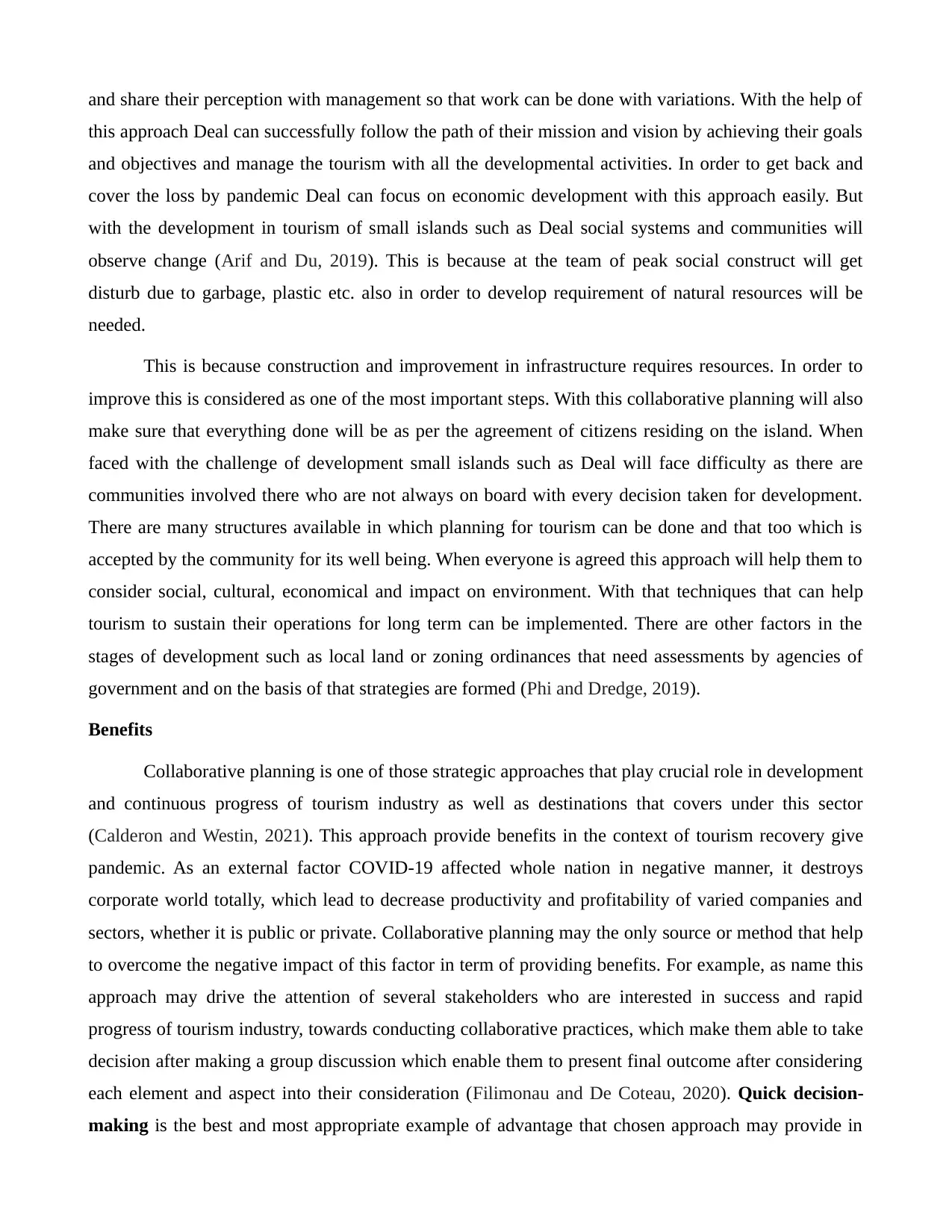
and share their perception with management so that work can be done with variations. With the help of
this approach Deal can successfully follow the path of their mission and vision by achieving their goals
and objectives and manage the tourism with all the developmental activities. In order to get back and
cover the loss by pandemic Deal can focus on economic development with this approach easily. But
with the development in tourism of small islands such as Deal social systems and communities will
observe change (Arif and Du, 2019). This is because at the team of peak social construct will get
disturb due to garbage, plastic etc. also in order to develop requirement of natural resources will be
needed.
This is because construction and improvement in infrastructure requires resources. In order to
improve this is considered as one of the most important steps. With this collaborative planning will also
make sure that everything done will be as per the agreement of citizens residing on the island. When
faced with the challenge of development small islands such as Deal will face difficulty as there are
communities involved there who are not always on board with every decision taken for development.
There are many structures available in which planning for tourism can be done and that too which is
accepted by the community for its well being. When everyone is agreed this approach will help them to
consider social, cultural, economical and impact on environment. With that techniques that can help
tourism to sustain their operations for long term can be implemented. There are other factors in the
stages of development such as local land or zoning ordinances that need assessments by agencies of
government and on the basis of that strategies are formed (Phi and Dredge, 2019).
Benefits
Collaborative planning is one of those strategic approaches that play crucial role in development
and continuous progress of tourism industry as well as destinations that covers under this sector
(Calderon and Westin, 2021). This approach provide benefits in the context of tourism recovery give
pandemic. As an external factor COVID-19 affected whole nation in negative manner, it destroys
corporate world totally, which lead to decrease productivity and profitability of varied companies and
sectors, whether it is public or private. Collaborative planning may the only source or method that help
to overcome the negative impact of this factor in term of providing benefits. For example, as name this
approach may drive the attention of several stakeholders who are interested in success and rapid
progress of tourism industry, towards conducting collaborative practices, which make them able to take
decision after making a group discussion which enable them to present final outcome after considering
each element and aspect into their consideration (Filimonau and De Coteau, 2020). Quick decision-
making is the best and most appropriate example of advantage that chosen approach may provide in
this approach Deal can successfully follow the path of their mission and vision by achieving their goals
and objectives and manage the tourism with all the developmental activities. In order to get back and
cover the loss by pandemic Deal can focus on economic development with this approach easily. But
with the development in tourism of small islands such as Deal social systems and communities will
observe change (Arif and Du, 2019). This is because at the team of peak social construct will get
disturb due to garbage, plastic etc. also in order to develop requirement of natural resources will be
needed.
This is because construction and improvement in infrastructure requires resources. In order to
improve this is considered as one of the most important steps. With this collaborative planning will also
make sure that everything done will be as per the agreement of citizens residing on the island. When
faced with the challenge of development small islands such as Deal will face difficulty as there are
communities involved there who are not always on board with every decision taken for development.
There are many structures available in which planning for tourism can be done and that too which is
accepted by the community for its well being. When everyone is agreed this approach will help them to
consider social, cultural, economical and impact on environment. With that techniques that can help
tourism to sustain their operations for long term can be implemented. There are other factors in the
stages of development such as local land or zoning ordinances that need assessments by agencies of
government and on the basis of that strategies are formed (Phi and Dredge, 2019).
Benefits
Collaborative planning is one of those strategic approaches that play crucial role in development
and continuous progress of tourism industry as well as destinations that covers under this sector
(Calderon and Westin, 2021). This approach provide benefits in the context of tourism recovery give
pandemic. As an external factor COVID-19 affected whole nation in negative manner, it destroys
corporate world totally, which lead to decrease productivity and profitability of varied companies and
sectors, whether it is public or private. Collaborative planning may the only source or method that help
to overcome the negative impact of this factor in term of providing benefits. For example, as name this
approach may drive the attention of several stakeholders who are interested in success and rapid
progress of tourism industry, towards conducting collaborative practices, which make them able to take
decision after making a group discussion which enable them to present final outcome after considering
each element and aspect into their consideration (Filimonau and De Coteau, 2020). Quick decision-
making is the best and most appropriate example of advantage that chosen approach may provide in
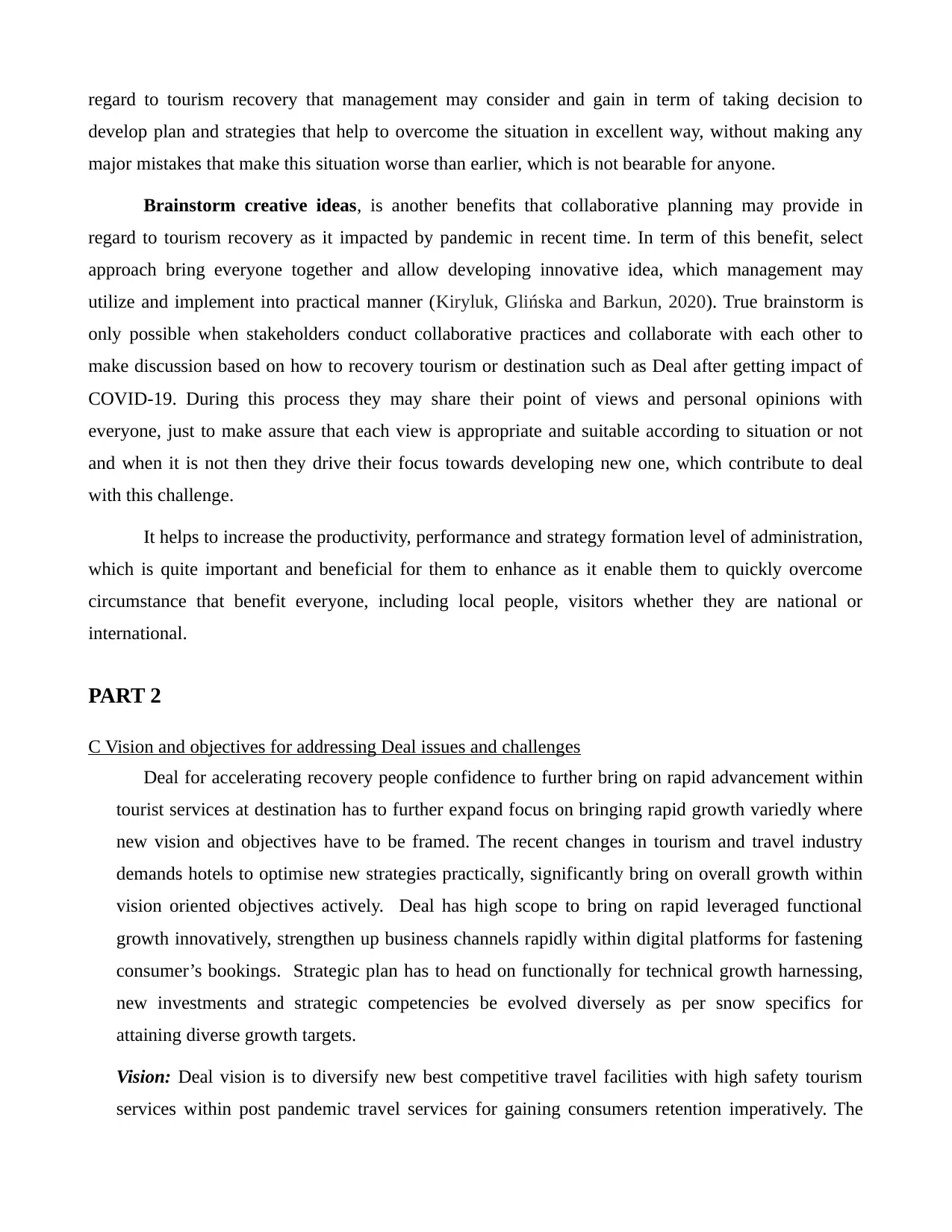
regard to tourism recovery that management may consider and gain in term of taking decision to
develop plan and strategies that help to overcome the situation in excellent way, without making any
major mistakes that make this situation worse than earlier, which is not bearable for anyone.
Brainstorm creative ideas, is another benefits that collaborative planning may provide in
regard to tourism recovery as it impacted by pandemic in recent time. In term of this benefit, select
approach bring everyone together and allow developing innovative idea, which management may
utilize and implement into practical manner (Kiryluk, Glińska and Barkun, 2020). True brainstorm is
only possible when stakeholders conduct collaborative practices and collaborate with each other to
make discussion based on how to recovery tourism or destination such as Deal after getting impact of
COVID-19. During this process they may share their point of views and personal opinions with
everyone, just to make assure that each view is appropriate and suitable according to situation or not
and when it is not then they drive their focus towards developing new one, which contribute to deal
with this challenge.
It helps to increase the productivity, performance and strategy formation level of administration,
which is quite important and beneficial for them to enhance as it enable them to quickly overcome
circumstance that benefit everyone, including local people, visitors whether they are national or
international.
PART 2
C Vision and objectives for addressing Deal issues and challenges
Deal for accelerating recovery people confidence to further bring on rapid advancement within
tourist services at destination has to further expand focus on bringing rapid growth variedly where
new vision and objectives have to be framed. The recent changes in tourism and travel industry
demands hotels to optimise new strategies practically, significantly bring on overall growth within
vision oriented objectives actively. Deal has high scope to bring on rapid leveraged functional
growth innovatively, strengthen up business channels rapidly within digital platforms for fastening
consumer’s bookings. Strategic plan has to head on functionally for technical growth harnessing,
new investments and strategic competencies be evolved diversely as per snow specifics for
attaining diverse growth targets.
Vision: Deal vision is to diversify new best competitive travel facilities with high safety tourism
services within post pandemic travel services for gaining consumers retention imperatively. The
develop plan and strategies that help to overcome the situation in excellent way, without making any
major mistakes that make this situation worse than earlier, which is not bearable for anyone.
Brainstorm creative ideas, is another benefits that collaborative planning may provide in
regard to tourism recovery as it impacted by pandemic in recent time. In term of this benefit, select
approach bring everyone together and allow developing innovative idea, which management may
utilize and implement into practical manner (Kiryluk, Glińska and Barkun, 2020). True brainstorm is
only possible when stakeholders conduct collaborative practices and collaborate with each other to
make discussion based on how to recovery tourism or destination such as Deal after getting impact of
COVID-19. During this process they may share their point of views and personal opinions with
everyone, just to make assure that each view is appropriate and suitable according to situation or not
and when it is not then they drive their focus towards developing new one, which contribute to deal
with this challenge.
It helps to increase the productivity, performance and strategy formation level of administration,
which is quite important and beneficial for them to enhance as it enable them to quickly overcome
circumstance that benefit everyone, including local people, visitors whether they are national or
international.
PART 2
C Vision and objectives for addressing Deal issues and challenges
Deal for accelerating recovery people confidence to further bring on rapid advancement within
tourist services at destination has to further expand focus on bringing rapid growth variedly where
new vision and objectives have to be framed. The recent changes in tourism and travel industry
demands hotels to optimise new strategies practically, significantly bring on overall growth within
vision oriented objectives actively. Deal has high scope to bring on rapid leveraged functional
growth innovatively, strengthen up business channels rapidly within digital platforms for fastening
consumer’s bookings. Strategic plan has to head on functionally for technical growth harnessing,
new investments and strategic competencies be evolved diversely as per snow specifics for
attaining diverse growth targets.
Vision: Deal vision is to diversify new best competitive travel facilities with high safety tourism
services within post pandemic travel services for gaining consumers retention imperatively. The
Paraphrase This Document
Need a fresh take? Get an instant paraphrase of this document with our AI Paraphraser
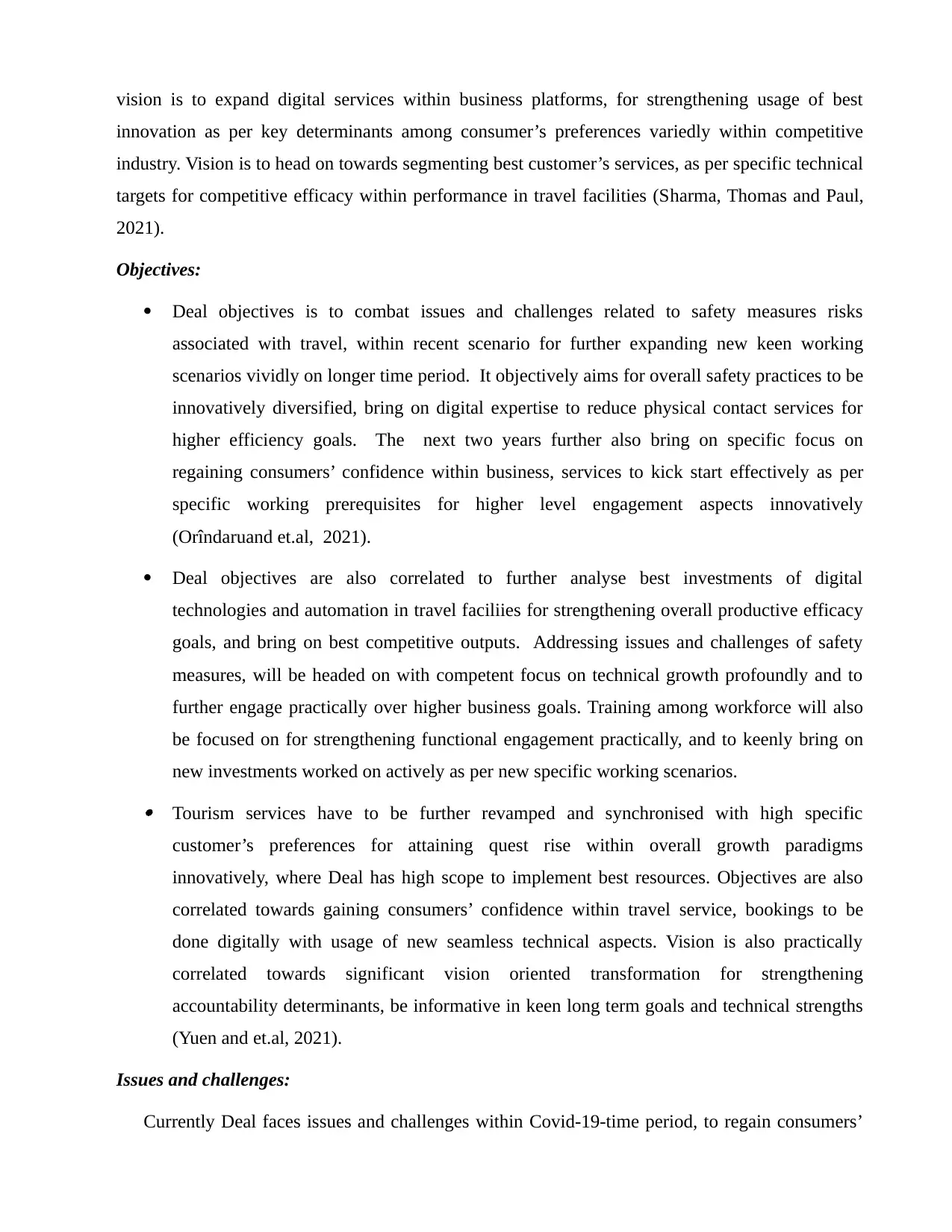
vision is to expand digital services within business platforms, for strengthening usage of best
innovation as per key determinants among consumer’s preferences variedly within competitive
industry. Vision is to head on towards segmenting best customer’s services, as per specific technical
targets for competitive efficacy within performance in travel facilities (Sharma, Thomas and Paul,
2021).
Objectives:
Deal objectives is to combat issues and challenges related to safety measures risks
associated with travel, within recent scenario for further expanding new keen working
scenarios vividly on longer time period. It objectively aims for overall safety practices to be
innovatively diversified, bring on digital expertise to reduce physical contact services for
higher efficiency goals. The next two years further also bring on specific focus on
regaining consumers’ confidence within business, services to kick start effectively as per
specific working prerequisites for higher level engagement aspects innovatively
(Orîndaruand et.al, 2021).
Deal objectives are also correlated to further analyse best investments of digital
technologies and automation in travel faciliies for strengthening overall productive efficacy
goals, and bring on best competitive outputs. Addressing issues and challenges of safety
measures, will be headed on with competent focus on technical growth profoundly and to
further engage practically over higher business goals. Training among workforce will also
be focused on for strengthening functional engagement practically, and to keenly bring on
new investments worked on actively as per new specific working scenarios. Tourism services have to be further revamped and synchronised with high specific
customer’s preferences for attaining quest rise within overall growth paradigms
innovatively, where Deal has high scope to implement best resources. Objectives are also
correlated towards gaining consumers’ confidence within travel service, bookings to be
done digitally with usage of new seamless technical aspects. Vision is also practically
correlated towards significant vision oriented transformation for strengthening
accountability determinants, be informative in keen long term goals and technical strengths
(Yuen and et.al, 2021).
Issues and challenges:
Currently Deal faces issues and challenges within Covid-19-time period, to regain consumers’
innovation as per key determinants among consumer’s preferences variedly within competitive
industry. Vision is to head on towards segmenting best customer’s services, as per specific technical
targets for competitive efficacy within performance in travel facilities (Sharma, Thomas and Paul,
2021).
Objectives:
Deal objectives is to combat issues and challenges related to safety measures risks
associated with travel, within recent scenario for further expanding new keen working
scenarios vividly on longer time period. It objectively aims for overall safety practices to be
innovatively diversified, bring on digital expertise to reduce physical contact services for
higher efficiency goals. The next two years further also bring on specific focus on
regaining consumers’ confidence within business, services to kick start effectively as per
specific working prerequisites for higher level engagement aspects innovatively
(Orîndaruand et.al, 2021).
Deal objectives are also correlated to further analyse best investments of digital
technologies and automation in travel faciliies for strengthening overall productive efficacy
goals, and bring on best competitive outputs. Addressing issues and challenges of safety
measures, will be headed on with competent focus on technical growth profoundly and to
further engage practically over higher business goals. Training among workforce will also
be focused on for strengthening functional engagement practically, and to keenly bring on
new investments worked on actively as per new specific working scenarios. Tourism services have to be further revamped and synchronised with high specific
customer’s preferences for attaining quest rise within overall growth paradigms
innovatively, where Deal has high scope to implement best resources. Objectives are also
correlated towards gaining consumers’ confidence within travel service, bookings to be
done digitally with usage of new seamless technical aspects. Vision is also practically
correlated towards significant vision oriented transformation for strengthening
accountability determinants, be informative in keen long term goals and technical strengths
(Yuen and et.al, 2021).
Issues and challenges:
Currently Deal faces issues and challenges within Covid-19-time period, to regain consumers’
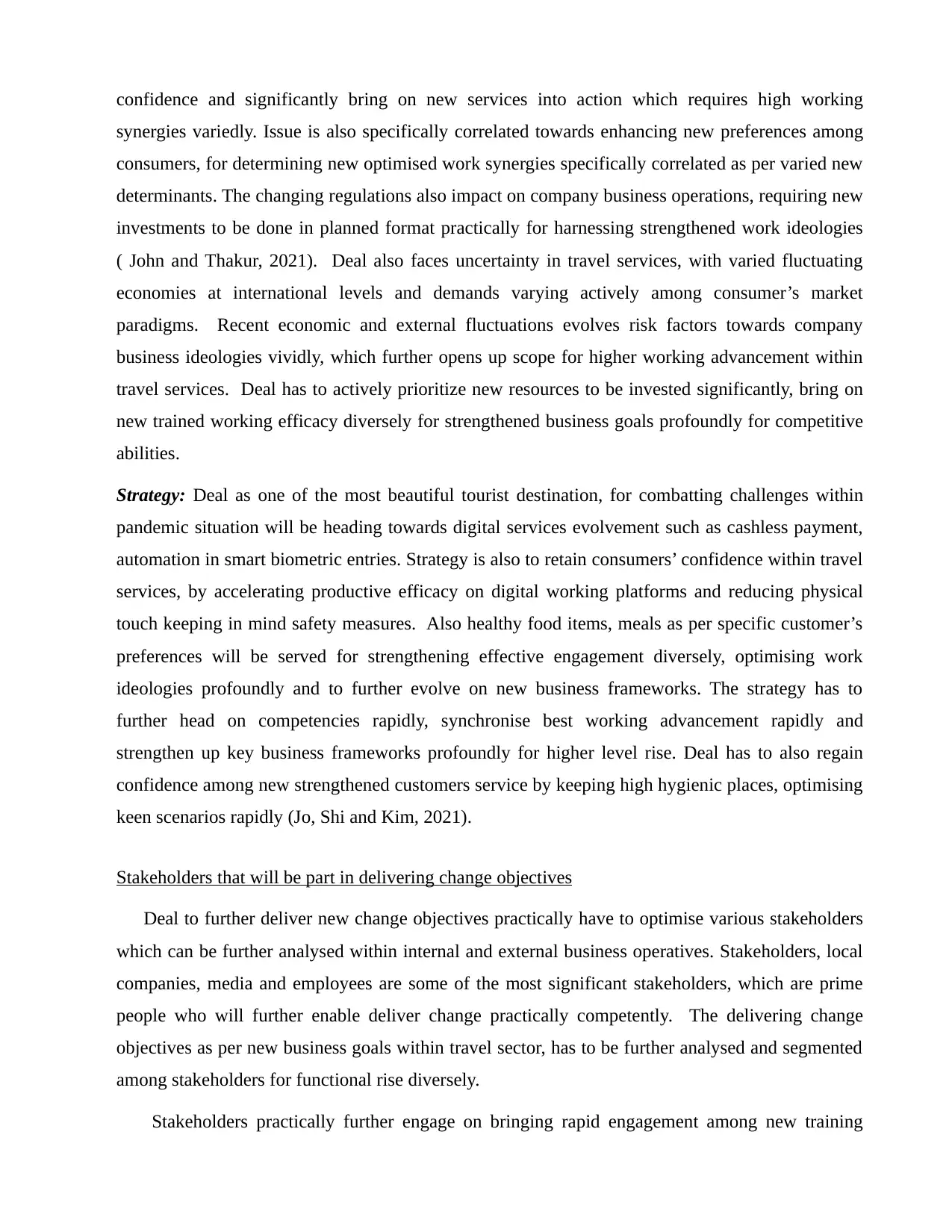
confidence and significantly bring on new services into action which requires high working
synergies variedly. Issue is also specifically correlated towards enhancing new preferences among
consumers, for determining new optimised work synergies specifically correlated as per varied new
determinants. The changing regulations also impact on company business operations, requiring new
investments to be done in planned format practically for harnessing strengthened work ideologies
( John and Thakur, 2021). Deal also faces uncertainty in travel services, with varied fluctuating
economies at international levels and demands varying actively among consumer’s market
paradigms. Recent economic and external fluctuations evolves risk factors towards company
business ideologies vividly, which further opens up scope for higher working advancement within
travel services. Deal has to actively prioritize new resources to be invested significantly, bring on
new trained working efficacy diversely for strengthened business goals profoundly for competitive
abilities.
Strategy: Deal as one of the most beautiful tourist destination, for combatting challenges within
pandemic situation will be heading towards digital services evolvement such as cashless payment,
automation in smart biometric entries. Strategy is also to retain consumers’ confidence within travel
services, by accelerating productive efficacy on digital working platforms and reducing physical
touch keeping in mind safety measures. Also healthy food items, meals as per specific customer’s
preferences will be served for strengthening effective engagement diversely, optimising work
ideologies profoundly and to further evolve on new business frameworks. The strategy has to
further head on competencies rapidly, synchronise best working advancement rapidly and
strengthen up key business frameworks profoundly for higher level rise. Deal has to also regain
confidence among new strengthened customers service by keeping high hygienic places, optimising
keen scenarios rapidly (Jo, Shi and Kim, 2021).
Stakeholders that will be part in delivering change objectives
Deal to further deliver new change objectives practically have to optimise various stakeholders
which can be further analysed within internal and external business operatives. Stakeholders, local
companies, media and employees are some of the most significant stakeholders, which are prime
people who will further enable deliver change practically competently. The delivering change
objectives as per new business goals within travel sector, has to be further analysed and segmented
among stakeholders for functional rise diversely.
Stakeholders practically further engage on bringing rapid engagement among new training
synergies variedly. Issue is also specifically correlated towards enhancing new preferences among
consumers, for determining new optimised work synergies specifically correlated as per varied new
determinants. The changing regulations also impact on company business operations, requiring new
investments to be done in planned format practically for harnessing strengthened work ideologies
( John and Thakur, 2021). Deal also faces uncertainty in travel services, with varied fluctuating
economies at international levels and demands varying actively among consumer’s market
paradigms. Recent economic and external fluctuations evolves risk factors towards company
business ideologies vividly, which further opens up scope for higher working advancement within
travel services. Deal has to actively prioritize new resources to be invested significantly, bring on
new trained working efficacy diversely for strengthened business goals profoundly for competitive
abilities.
Strategy: Deal as one of the most beautiful tourist destination, for combatting challenges within
pandemic situation will be heading towards digital services evolvement such as cashless payment,
automation in smart biometric entries. Strategy is also to retain consumers’ confidence within travel
services, by accelerating productive efficacy on digital working platforms and reducing physical
touch keeping in mind safety measures. Also healthy food items, meals as per specific customer’s
preferences will be served for strengthening effective engagement diversely, optimising work
ideologies profoundly and to further evolve on new business frameworks. The strategy has to
further head on competencies rapidly, synchronise best working advancement rapidly and
strengthen up key business frameworks profoundly for higher level rise. Deal has to also regain
confidence among new strengthened customers service by keeping high hygienic places, optimising
keen scenarios rapidly (Jo, Shi and Kim, 2021).
Stakeholders that will be part in delivering change objectives
Deal to further deliver new change objectives practically have to optimise various stakeholders
which can be further analysed within internal and external business operatives. Stakeholders, local
companies, media and employees are some of the most significant stakeholders, which are prime
people who will further enable deliver change practically competently. The delivering change
objectives as per new business goals within travel sector, has to be further analysed and segmented
among stakeholders for functional rise diversely.
Stakeholders practically further engage on bringing rapid engagement among new training
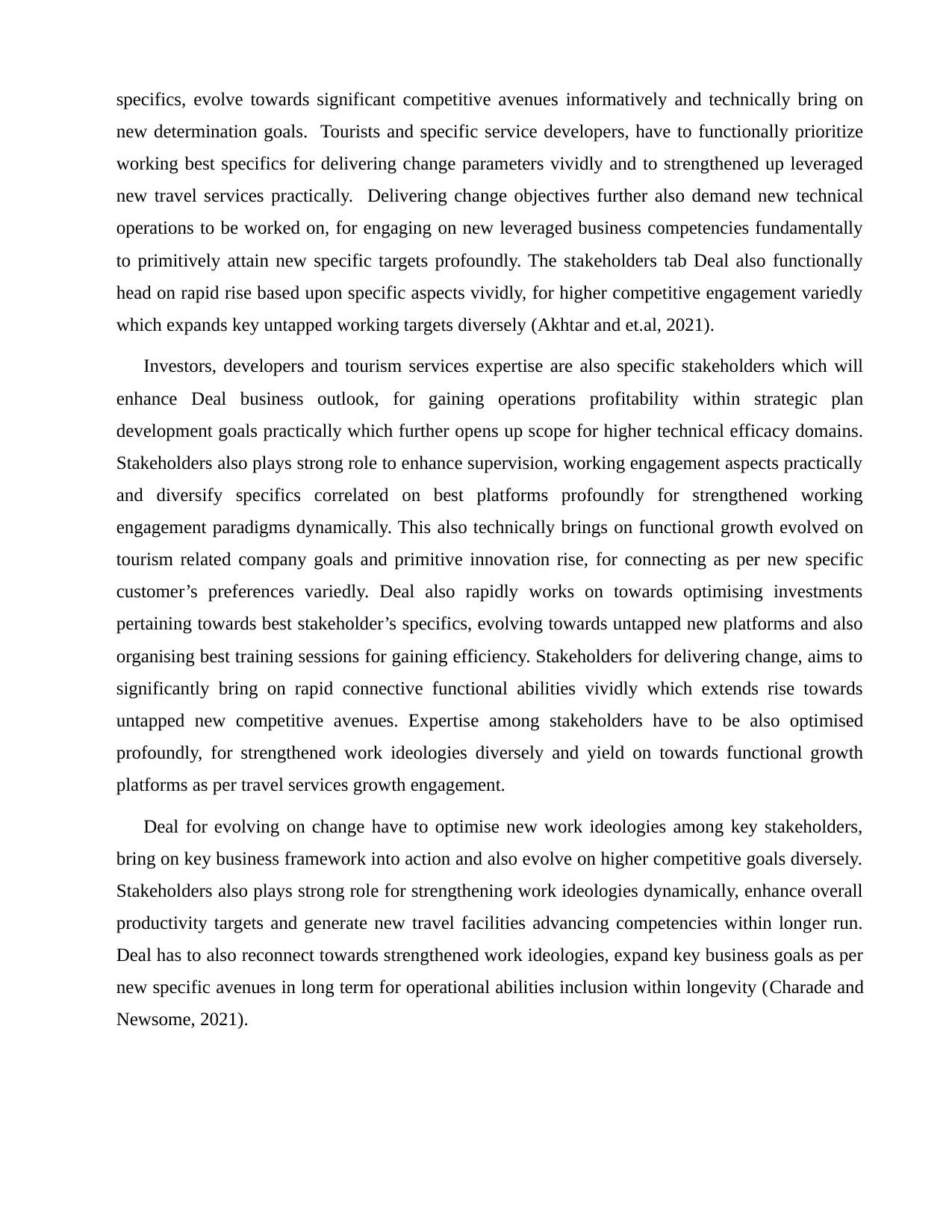
specifics, evolve towards significant competitive avenues informatively and technically bring on
new determination goals. Tourists and specific service developers, have to functionally prioritize
working best specifics for delivering change parameters vividly and to strengthened up leveraged
new travel services practically. Delivering change objectives further also demand new technical
operations to be worked on, for engaging on new leveraged business competencies fundamentally
to primitively attain new specific targets profoundly. The stakeholders tab Deal also functionally
head on rapid rise based upon specific aspects vividly, for higher competitive engagement variedly
which expands key untapped working targets diversely (Akhtar and et.al, 2021).
Investors, developers and tourism services expertise are also specific stakeholders which will
enhance Deal business outlook, for gaining operations profitability within strategic plan
development goals practically which further opens up scope for higher technical efficacy domains.
Stakeholders also plays strong role to enhance supervision, working engagement aspects practically
and diversify specifics correlated on best platforms profoundly for strengthened working
engagement paradigms dynamically. This also technically brings on functional growth evolved on
tourism related company goals and primitive innovation rise, for connecting as per new specific
customer’s preferences variedly. Deal also rapidly works on towards optimising investments
pertaining towards best stakeholder’s specifics, evolving towards untapped new platforms and also
organising best training sessions for gaining efficiency. Stakeholders for delivering change, aims to
significantly bring on rapid connective functional abilities vividly which extends rise towards
untapped new competitive avenues. Expertise among stakeholders have to be also optimised
profoundly, for strengthened work ideologies diversely and yield on towards functional growth
platforms as per travel services growth engagement.
Deal for evolving on change have to optimise new work ideologies among key stakeholders,
bring on key business framework into action and also evolve on higher competitive goals diversely.
Stakeholders also plays strong role for strengthening work ideologies dynamically, enhance overall
productivity targets and generate new travel facilities advancing competencies within longer run.
Deal has to also reconnect towards strengthened work ideologies, expand key business goals as per
new specific avenues in long term for operational abilities inclusion within longevity (Charade and
Newsome, 2021).
new determination goals. Tourists and specific service developers, have to functionally prioritize
working best specifics for delivering change parameters vividly and to strengthened up leveraged
new travel services practically. Delivering change objectives further also demand new technical
operations to be worked on, for engaging on new leveraged business competencies fundamentally
to primitively attain new specific targets profoundly. The stakeholders tab Deal also functionally
head on rapid rise based upon specific aspects vividly, for higher competitive engagement variedly
which expands key untapped working targets diversely (Akhtar and et.al, 2021).
Investors, developers and tourism services expertise are also specific stakeholders which will
enhance Deal business outlook, for gaining operations profitability within strategic plan
development goals practically which further opens up scope for higher technical efficacy domains.
Stakeholders also plays strong role to enhance supervision, working engagement aspects practically
and diversify specifics correlated on best platforms profoundly for strengthened working
engagement paradigms dynamically. This also technically brings on functional growth evolved on
tourism related company goals and primitive innovation rise, for connecting as per new specific
customer’s preferences variedly. Deal also rapidly works on towards optimising investments
pertaining towards best stakeholder’s specifics, evolving towards untapped new platforms and also
organising best training sessions for gaining efficiency. Stakeholders for delivering change, aims to
significantly bring on rapid connective functional abilities vividly which extends rise towards
untapped new competitive avenues. Expertise among stakeholders have to be also optimised
profoundly, for strengthened work ideologies diversely and yield on towards functional growth
platforms as per travel services growth engagement.
Deal for evolving on change have to optimise new work ideologies among key stakeholders,
bring on key business framework into action and also evolve on higher competitive goals diversely.
Stakeholders also plays strong role for strengthening work ideologies dynamically, enhance overall
productivity targets and generate new travel facilities advancing competencies within longer run.
Deal has to also reconnect towards strengthened work ideologies, expand key business goals as per
new specific avenues in long term for operational abilities inclusion within longevity (Charade and
Newsome, 2021).
Secure Best Marks with AI Grader
Need help grading? Try our AI Grader for instant feedback on your assignments.
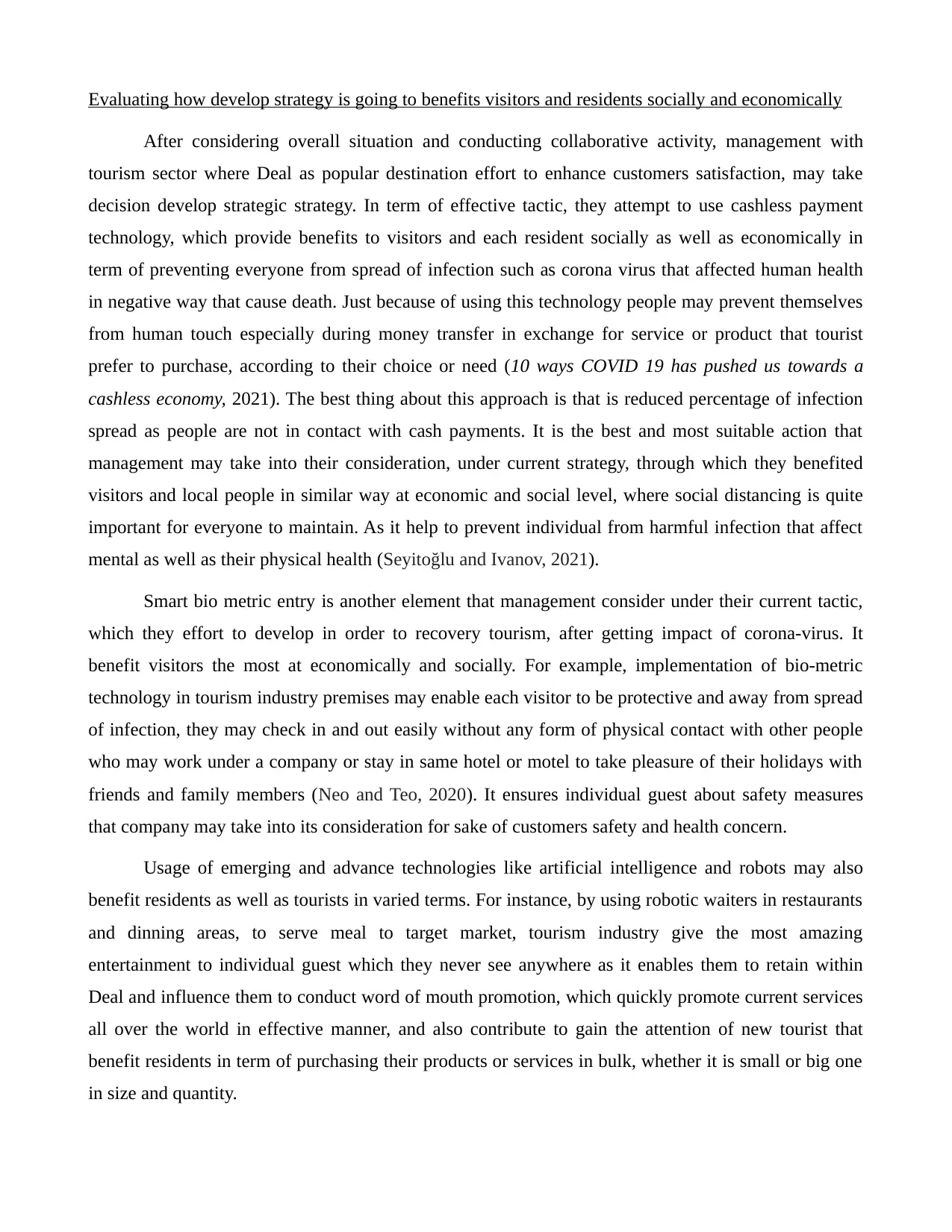
Evaluating how develop strategy is going to benefits visitors and residents socially and economically
After considering overall situation and conducting collaborative activity, management with
tourism sector where Deal as popular destination effort to enhance customers satisfaction, may take
decision develop strategic strategy. In term of effective tactic, they attempt to use cashless payment
technology, which provide benefits to visitors and each resident socially as well as economically in
term of preventing everyone from spread of infection such as corona virus that affected human health
in negative way that cause death. Just because of using this technology people may prevent themselves
from human touch especially during money transfer in exchange for service or product that tourist
prefer to purchase, according to their choice or need (10 ways COVID 19 has pushed us towards a
cashless economy, 2021). The best thing about this approach is that is reduced percentage of infection
spread as people are not in contact with cash payments. It is the best and most suitable action that
management may take into their consideration, under current strategy, through which they benefited
visitors and local people in similar way at economic and social level, where social distancing is quite
important for everyone to maintain. As it help to prevent individual from harmful infection that affect
mental as well as their physical health (Seyitoğlu and Ivanov, 2021).
Smart bio metric entry is another element that management consider under their current tactic,
which they effort to develop in order to recovery tourism, after getting impact of corona-virus. It
benefit visitors the most at economically and socially. For example, implementation of bio-metric
technology in tourism industry premises may enable each visitor to be protective and away from spread
of infection, they may check in and out easily without any form of physical contact with other people
who may work under a company or stay in same hotel or motel to take pleasure of their holidays with
friends and family members (Neo and Teo, 2020). It ensures individual guest about safety measures
that company may take into its consideration for sake of customers safety and health concern.
Usage of emerging and advance technologies like artificial intelligence and robots may also
benefit residents as well as tourists in varied terms. For instance, by using robotic waiters in restaurants
and dinning areas, to serve meal to target market, tourism industry give the most amazing
entertainment to individual guest which they never see anywhere as it enables them to retain within
Deal and influence them to conduct word of mouth promotion, which quickly promote current services
all over the world in effective manner, and also contribute to gain the attention of new tourist that
benefit residents in term of purchasing their products or services in bulk, whether it is small or big one
in size and quantity.
After considering overall situation and conducting collaborative activity, management with
tourism sector where Deal as popular destination effort to enhance customers satisfaction, may take
decision develop strategic strategy. In term of effective tactic, they attempt to use cashless payment
technology, which provide benefits to visitors and each resident socially as well as economically in
term of preventing everyone from spread of infection such as corona virus that affected human health
in negative way that cause death. Just because of using this technology people may prevent themselves
from human touch especially during money transfer in exchange for service or product that tourist
prefer to purchase, according to their choice or need (10 ways COVID 19 has pushed us towards a
cashless economy, 2021). The best thing about this approach is that is reduced percentage of infection
spread as people are not in contact with cash payments. It is the best and most suitable action that
management may take into their consideration, under current strategy, through which they benefited
visitors and local people in similar way at economic and social level, where social distancing is quite
important for everyone to maintain. As it help to prevent individual from harmful infection that affect
mental as well as their physical health (Seyitoğlu and Ivanov, 2021).
Smart bio metric entry is another element that management consider under their current tactic,
which they effort to develop in order to recovery tourism, after getting impact of corona-virus. It
benefit visitors the most at economically and socially. For example, implementation of bio-metric
technology in tourism industry premises may enable each visitor to be protective and away from spread
of infection, they may check in and out easily without any form of physical contact with other people
who may work under a company or stay in same hotel or motel to take pleasure of their holidays with
friends and family members (Neo and Teo, 2020). It ensures individual guest about safety measures
that company may take into its consideration for sake of customers safety and health concern.
Usage of emerging and advance technologies like artificial intelligence and robots may also
benefit residents as well as tourists in varied terms. For instance, by using robotic waiters in restaurants
and dinning areas, to serve meal to target market, tourism industry give the most amazing
entertainment to individual guest which they never see anywhere as it enables them to retain within
Deal and influence them to conduct word of mouth promotion, which quickly promote current services
all over the world in effective manner, and also contribute to gain the attention of new tourist that
benefit residents in term of purchasing their products or services in bulk, whether it is small or big one
in size and quantity.
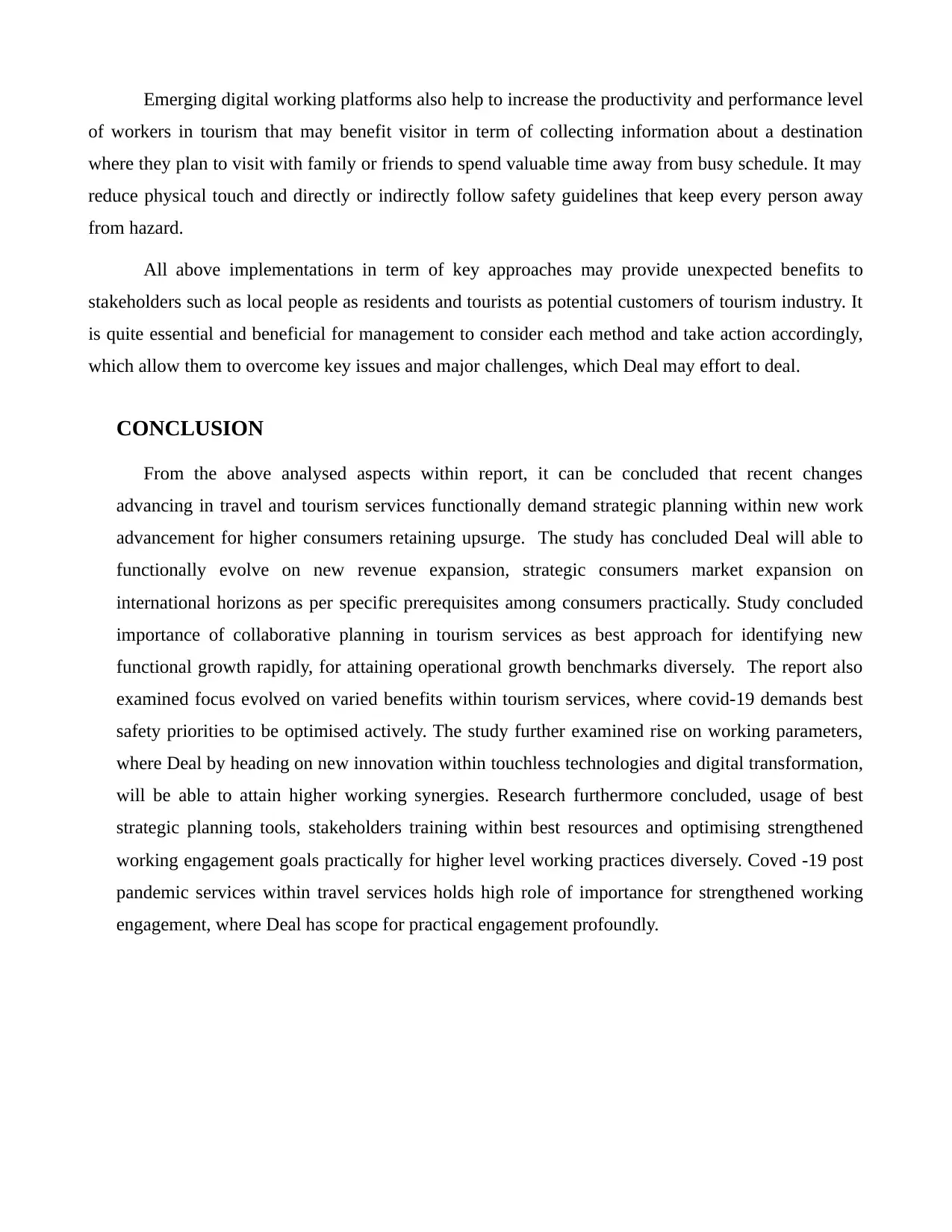
Emerging digital working platforms also help to increase the productivity and performance level
of workers in tourism that may benefit visitor in term of collecting information about a destination
where they plan to visit with family or friends to spend valuable time away from busy schedule. It may
reduce physical touch and directly or indirectly follow safety guidelines that keep every person away
from hazard.
All above implementations in term of key approaches may provide unexpected benefits to
stakeholders such as local people as residents and tourists as potential customers of tourism industry. It
is quite essential and beneficial for management to consider each method and take action accordingly,
which allow them to overcome key issues and major challenges, which Deal may effort to deal.
CONCLUSION
From the above analysed aspects within report, it can be concluded that recent changes
advancing in travel and tourism services functionally demand strategic planning within new work
advancement for higher consumers retaining upsurge. The study has concluded Deal will able to
functionally evolve on new revenue expansion, strategic consumers market expansion on
international horizons as per specific prerequisites among consumers practically. Study concluded
importance of collaborative planning in tourism services as best approach for identifying new
functional growth rapidly, for attaining operational growth benchmarks diversely. The report also
examined focus evolved on varied benefits within tourism services, where covid-19 demands best
safety priorities to be optimised actively. The study further examined rise on working parameters,
where Deal by heading on new innovation within touchless technologies and digital transformation,
will be able to attain higher working synergies. Research furthermore concluded, usage of best
strategic planning tools, stakeholders training within best resources and optimising strengthened
working engagement goals practically for higher level working practices diversely. Coved -19 post
pandemic services within travel services holds high role of importance for strengthened working
engagement, where Deal has scope for practical engagement profoundly.
of workers in tourism that may benefit visitor in term of collecting information about a destination
where they plan to visit with family or friends to spend valuable time away from busy schedule. It may
reduce physical touch and directly or indirectly follow safety guidelines that keep every person away
from hazard.
All above implementations in term of key approaches may provide unexpected benefits to
stakeholders such as local people as residents and tourists as potential customers of tourism industry. It
is quite essential and beneficial for management to consider each method and take action accordingly,
which allow them to overcome key issues and major challenges, which Deal may effort to deal.
CONCLUSION
From the above analysed aspects within report, it can be concluded that recent changes
advancing in travel and tourism services functionally demand strategic planning within new work
advancement for higher consumers retaining upsurge. The study has concluded Deal will able to
functionally evolve on new revenue expansion, strategic consumers market expansion on
international horizons as per specific prerequisites among consumers practically. Study concluded
importance of collaborative planning in tourism services as best approach for identifying new
functional growth rapidly, for attaining operational growth benchmarks diversely. The report also
examined focus evolved on varied benefits within tourism services, where covid-19 demands best
safety priorities to be optimised actively. The study further examined rise on working parameters,
where Deal by heading on new innovation within touchless technologies and digital transformation,
will be able to attain higher working synergies. Research furthermore concluded, usage of best
strategic planning tools, stakeholders training within best resources and optimising strengthened
working engagement goals practically for higher level working practices diversely. Coved -19 post
pandemic services within travel services holds high role of importance for strengthened working
engagement, where Deal has scope for practical engagement profoundly.
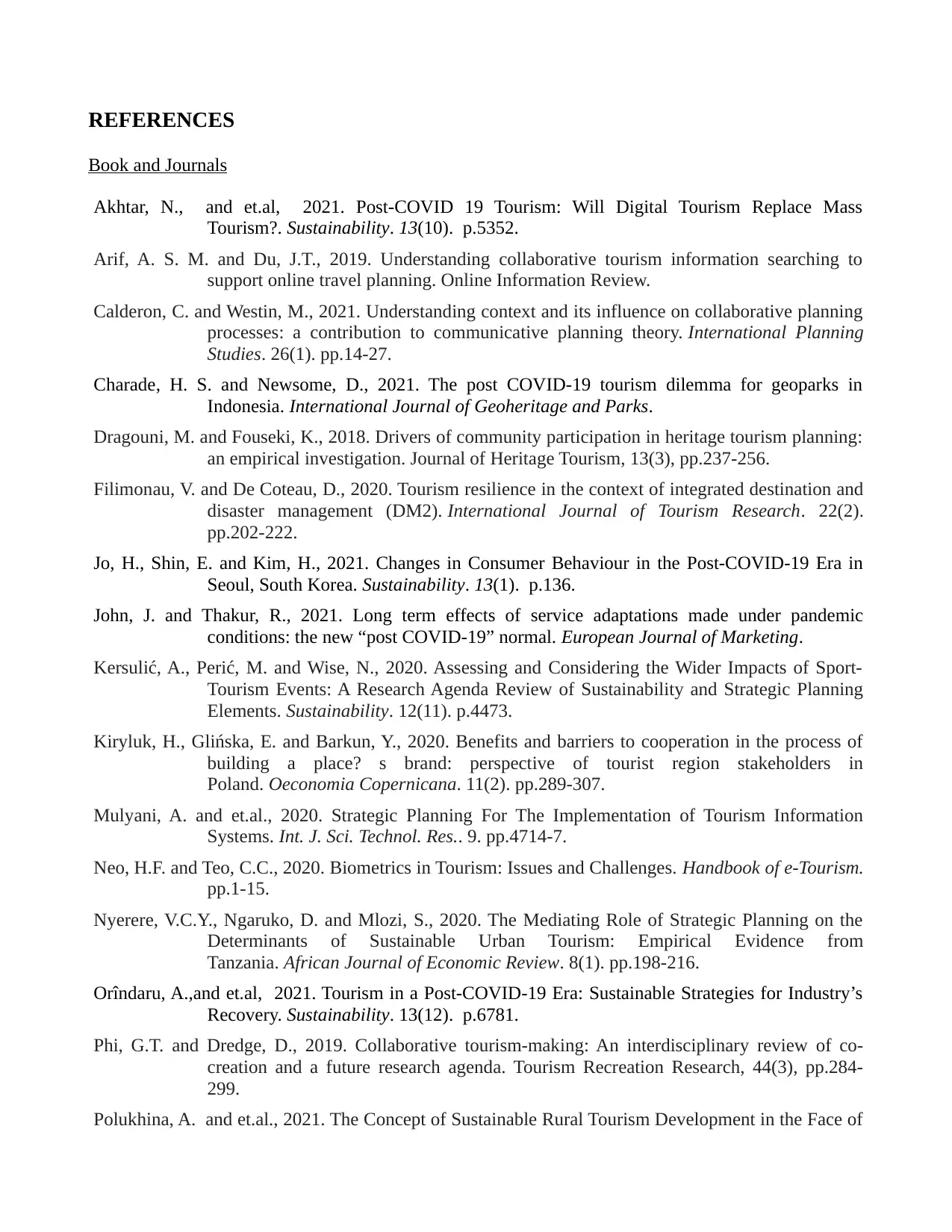
REFERENCES
Book and Journals
Akhtar, N., and et.al, 2021. Post-COVID 19 Tourism: Will Digital Tourism Replace Mass
Tourism?. Sustainability. 13(10). p.5352.
Arif, A. S. M. and Du, J.T., 2019. Understanding collaborative tourism information searching to
support online travel planning. Online Information Review.
Calderon, C. and Westin, M., 2021. Understanding context and its influence on collaborative planning
processes: a contribution to communicative planning theory. International Planning
Studies. 26(1). pp.14-27.
Charade, H. S. and Newsome, D., 2021. The post COVID-19 tourism dilemma for geoparks in
Indonesia. International Journal of Geoheritage and Parks.
Dragouni, M. and Fouseki, K., 2018. Drivers of community participation in heritage tourism planning:
an empirical investigation. Journal of Heritage Tourism, 13(3), pp.237-256.
Filimonau, V. and De Coteau, D., 2020. Tourism resilience in the context of integrated destination and
disaster management (DM2). International Journal of Tourism Research. 22(2).
pp.202-222.
Jo, H., Shin, E. and Kim, H., 2021. Changes in Consumer Behaviour in the Post-COVID-19 Era in
Seoul, South Korea. Sustainability. 13(1). p.136.
John, J. and Thakur, R., 2021. Long term effects of service adaptations made under pandemic
conditions: the new “post COVID-19” normal. European Journal of Marketing.
Kersulić, A., Perić, M. and Wise, N., 2020. Assessing and Considering the Wider Impacts of Sport-
Tourism Events: A Research Agenda Review of Sustainability and Strategic Planning
Elements. Sustainability. 12(11). p.4473.
Kiryluk, H., Glińska, E. and Barkun, Y., 2020. Benefits and barriers to cooperation in the process of
building a place? s brand: perspective of tourist region stakeholders in
Poland. Oeconomia Copernicana. 11(2). pp.289-307.
Mulyani, A. and et.al., 2020. Strategic Planning For The Implementation of Tourism Information
Systems. Int. J. Sci. Technol. Res.. 9. pp.4714-7.
Neo, H.F. and Teo, C.C., 2020. Biometrics in Tourism: Issues and Challenges. Handbook of e-Tourism.
pp.1-15.
Nyerere, V.C.Y., Ngaruko, D. and Mlozi, S., 2020. The Mediating Role of Strategic Planning on the
Determinants of Sustainable Urban Tourism: Empirical Evidence from
Tanzania. African Journal of Economic Review. 8(1). pp.198-216.
Orîndaru, A.,and et.al, 2021. Tourism in a Post-COVID-19 Era: Sustainable Strategies for Industry’s
Recovery. Sustainability. 13(12). p.6781.
Phi, G.T. and Dredge, D., 2019. Collaborative tourism-making: An interdisciplinary review of co-
creation and a future research agenda. Tourism Recreation Research, 44(3), pp.284-
299.
Polukhina, A. and et.al., 2021. The Concept of Sustainable Rural Tourism Development in the Face of
Book and Journals
Akhtar, N., and et.al, 2021. Post-COVID 19 Tourism: Will Digital Tourism Replace Mass
Tourism?. Sustainability. 13(10). p.5352.
Arif, A. S. M. and Du, J.T., 2019. Understanding collaborative tourism information searching to
support online travel planning. Online Information Review.
Calderon, C. and Westin, M., 2021. Understanding context and its influence on collaborative planning
processes: a contribution to communicative planning theory. International Planning
Studies. 26(1). pp.14-27.
Charade, H. S. and Newsome, D., 2021. The post COVID-19 tourism dilemma for geoparks in
Indonesia. International Journal of Geoheritage and Parks.
Dragouni, M. and Fouseki, K., 2018. Drivers of community participation in heritage tourism planning:
an empirical investigation. Journal of Heritage Tourism, 13(3), pp.237-256.
Filimonau, V. and De Coteau, D., 2020. Tourism resilience in the context of integrated destination and
disaster management (DM2). International Journal of Tourism Research. 22(2).
pp.202-222.
Jo, H., Shin, E. and Kim, H., 2021. Changes in Consumer Behaviour in the Post-COVID-19 Era in
Seoul, South Korea. Sustainability. 13(1). p.136.
John, J. and Thakur, R., 2021. Long term effects of service adaptations made under pandemic
conditions: the new “post COVID-19” normal. European Journal of Marketing.
Kersulić, A., Perić, M. and Wise, N., 2020. Assessing and Considering the Wider Impacts of Sport-
Tourism Events: A Research Agenda Review of Sustainability and Strategic Planning
Elements. Sustainability. 12(11). p.4473.
Kiryluk, H., Glińska, E. and Barkun, Y., 2020. Benefits and barriers to cooperation in the process of
building a place? s brand: perspective of tourist region stakeholders in
Poland. Oeconomia Copernicana. 11(2). pp.289-307.
Mulyani, A. and et.al., 2020. Strategic Planning For The Implementation of Tourism Information
Systems. Int. J. Sci. Technol. Res.. 9. pp.4714-7.
Neo, H.F. and Teo, C.C., 2020. Biometrics in Tourism: Issues and Challenges. Handbook of e-Tourism.
pp.1-15.
Nyerere, V.C.Y., Ngaruko, D. and Mlozi, S., 2020. The Mediating Role of Strategic Planning on the
Determinants of Sustainable Urban Tourism: Empirical Evidence from
Tanzania. African Journal of Economic Review. 8(1). pp.198-216.
Orîndaru, A.,and et.al, 2021. Tourism in a Post-COVID-19 Era: Sustainable Strategies for Industry’s
Recovery. Sustainability. 13(12). p.6781.
Phi, G.T. and Dredge, D., 2019. Collaborative tourism-making: An interdisciplinary review of co-
creation and a future research agenda. Tourism Recreation Research, 44(3), pp.284-
299.
Polukhina, A. and et.al., 2021. The Concept of Sustainable Rural Tourism Development in the Face of
Paraphrase This Document
Need a fresh take? Get an instant paraphrase of this document with our AI Paraphraser
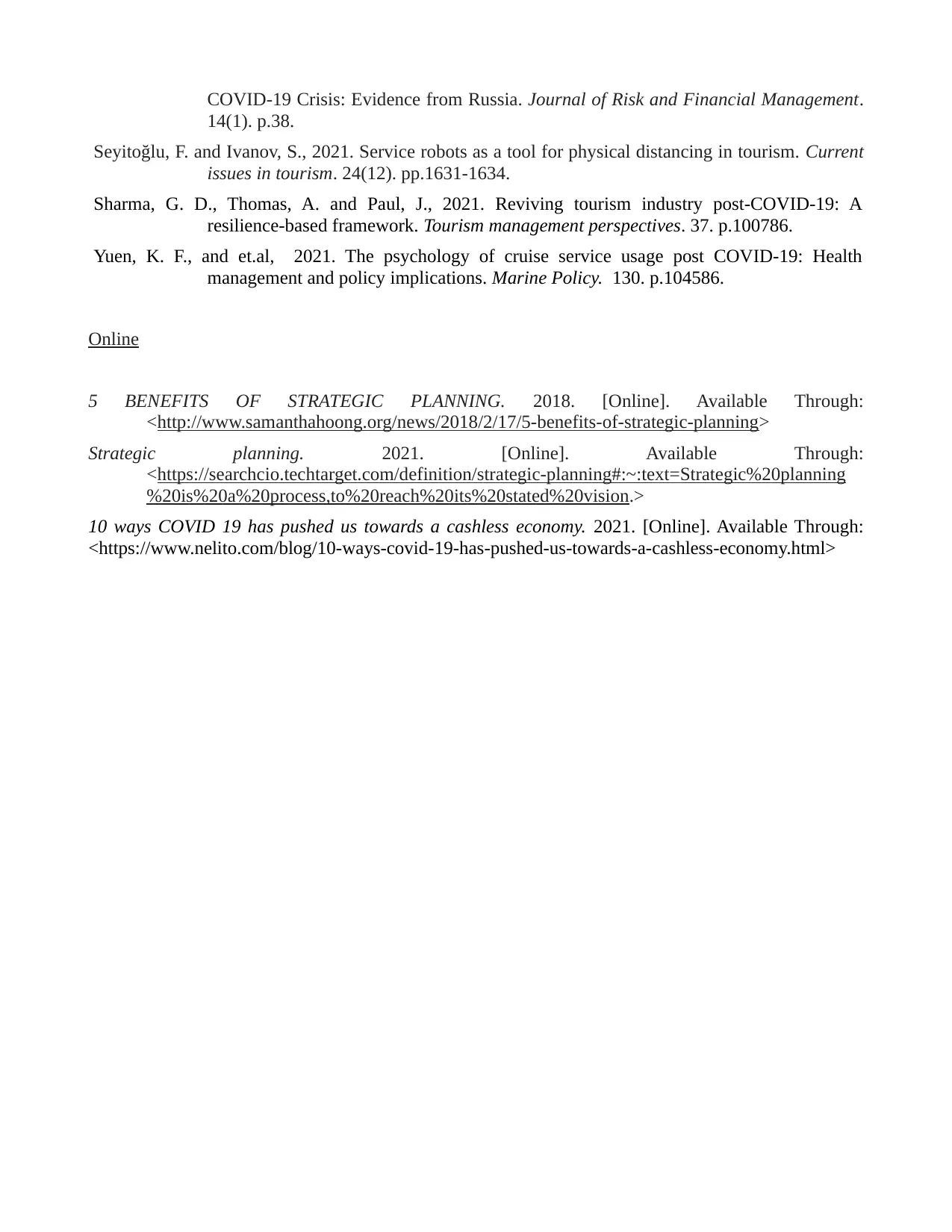
COVID-19 Crisis: Evidence from Russia. Journal of Risk and Financial Management.
14(1). p.38.
Seyitoğlu, F. and Ivanov, S., 2021. Service robots as a tool for physical distancing in tourism. Current
issues in tourism. 24(12). pp.1631-1634.
Sharma, G. D., Thomas, A. and Paul, J., 2021. Reviving tourism industry post-COVID-19: A
resilience-based framework. Tourism management perspectives. 37. p.100786.
Yuen, K. F., and et.al, 2021. The psychology of cruise service usage post COVID-19: Health
management and policy implications. Marine Policy. 130. p.104586.
Online
5 BENEFITS OF STRATEGIC PLANNING. 2018. [Online]. Available Through:
<http://www.samanthahoong.org/news/2018/2/17/5-benefits-of-strategic-planning>
Strategic planning. 2021. [Online]. Available Through:
<https://searchcio.techtarget.com/definition/strategic-planning#:~:text=Strategic%20planning
%20is%20a%20process,to%20reach%20its%20stated%20vision.>
10 ways COVID 19 has pushed us towards a cashless economy. 2021. [Online]. Available Through:
<https://www.nelito.com/blog/10-ways-covid-19-has-pushed-us-towards-a-cashless-economy.html>
14(1). p.38.
Seyitoğlu, F. and Ivanov, S., 2021. Service robots as a tool for physical distancing in tourism. Current
issues in tourism. 24(12). pp.1631-1634.
Sharma, G. D., Thomas, A. and Paul, J., 2021. Reviving tourism industry post-COVID-19: A
resilience-based framework. Tourism management perspectives. 37. p.100786.
Yuen, K. F., and et.al, 2021. The psychology of cruise service usage post COVID-19: Health
management and policy implications. Marine Policy. 130. p.104586.
Online
5 BENEFITS OF STRATEGIC PLANNING. 2018. [Online]. Available Through:
<http://www.samanthahoong.org/news/2018/2/17/5-benefits-of-strategic-planning>
Strategic planning. 2021. [Online]. Available Through:
<https://searchcio.techtarget.com/definition/strategic-planning#:~:text=Strategic%20planning
%20is%20a%20process,to%20reach%20its%20stated%20vision.>
10 ways COVID 19 has pushed us towards a cashless economy. 2021. [Online]. Available Through:
<https://www.nelito.com/blog/10-ways-covid-19-has-pushed-us-towards-a-cashless-economy.html>
1 out of 14
Related Documents
Your All-in-One AI-Powered Toolkit for Academic Success.
+13062052269
info@desklib.com
Available 24*7 on WhatsApp / Email
![[object Object]](/_next/static/media/star-bottom.7253800d.svg)
Unlock your academic potential
© 2024 | Zucol Services PVT LTD | All rights reserved.




